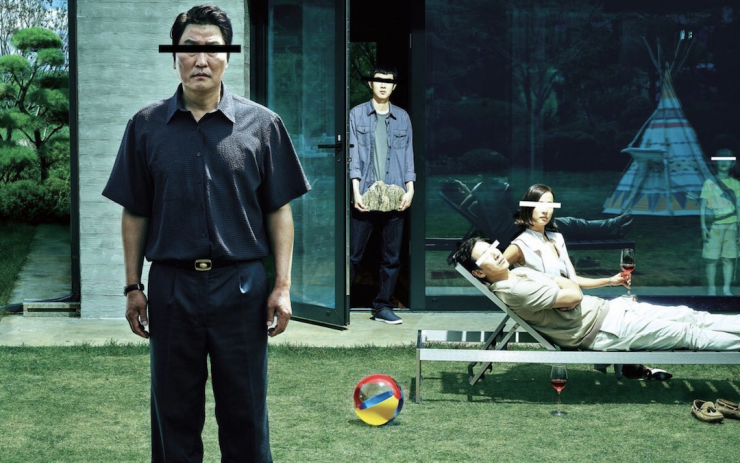Despite victory, not a single actor from the film was nominated elsewhere.
Since its Palme d’Or victory at the Cannes Film Festival last year, South Korean director Bong Joon-ho’s “Parasite” has been an award season powerhouse, accomplishing what very few films made outside the United States have achieved and receiving several accolades from various prominent awards associations. On Sunday, January 19th, the film became an even greater presence when, during the 26th Screen Actors Guild Awards, “Parasite” triumphed over all other films when the film received the award for Best Ensemble, beating out the likes of American-made favorites like “Once Upon a Time in Hollywood” and “Jojo Rabbit” in the process.
“Parasite”’s win is noteworthy for a variety of reasons. For one thing, this marks the first time in the ceremony’s twenty-six year history that a foreign language film has won its most distinguished honor. In fact, prior to “Parasite,” only one other foreign language film, 1998’s “Life is Beautiful,” had even been nominated in this category. Judging by this limited number of such films being included, foreign films have long been an often-ignored minority in the awards circuit. This is especially true when it comes to acting; perhaps in large part due to the language barrier, very few performances and casts from foreign films have been nominated, let alone won, any significant accolades since the inception of such recognition.
Even with “Parasite” as the recipient for this year’s Best Ensemble Award, this year’s ceremony shows that the film industry still struggles to acknowledge the existence of foreign language performances among the several films submitted and considered for awards. Apart from Best Ensemble, “Parasite” received no other nominations from the Screen Actors Guild, meaning that not a single actor from the film was considered for any of the other major categories. This is not the first time this has happened; not one individual actor from either “The Full Monty”in 1995 and “The Lord of the Rings: The Return of the King” in 2003 was nominated for a SAG, yet both films still ended up winning Best Ensemble. However, given its status as a foreign film, the absence of “Parasite” in any other categories proves that its high quality may not be enough to sway voters into considering performances not spoken in English.
Looking at the awards “Parasite” has won or at least been nominated for from other associations, the inability for any individual actor from the film to receive any recognition becomes more apparent. Despite the film’s numerous award nominations, most of them fall into the same categories – writing, directing, and other technical aspects of filmmaking. While Bong Joon-ho has received the bulk of nominations for his film, as have many of the people working behind the camera, those shown in front of the camera have not been so fortunate, with few of the actors receiving individual nominations for their performances. Even the film’s Best Ensemble win could be interpreted less as praise for the film’s cast than as a way to acknowledge the greatness of the film as a whole, regardless of what is thought of the cast.
This is not to say that individual performances in “Parasite” have gone completely ignored, as there have been some groups that have chosen to officially recognize specific actors from the film. Of the ensemble, Song Kang-ho, who plays the Kim family patriarch Kim Ki-taek, has been the actor nominated most frequently for his work in the film, being named as a potential Best Supporting Actor by such groups as the Los Angeles Film Critics Association and the National Society of Film Critics among others. In addition, the Chicago Film Critics Association also nominated Cho Yeo-jeong, who plays the mother of the Park family Yeon-gyo, for Best Supporting Actress. Still, these are exceptions, and the rest of the cast, in spite of their strong performances, have not been given the honor of such acknowledgement.
Why is this the case? Why is it that, despite “Parasite” being so heavily lauded overall, its acting has gone largely unnoticed? As it is a film made in the Korean language instead of English, there’s a chance that some voters have been deterred by their inability to instantly understand what is being said. There is some rational to this logic; after all, how can one pay attention to a film’s acting when they’re constantly having to read subtitles, partially distracting them from what they are seeing on screen?
Then again, maybe the film being praised more as a whole than the sum of its parts may prove beneficial in the long run. The film’s acting nominations may be minimal, but this should not be seen as a sign of discouragement for the film’s future prospects, as “Parasite” remains a major contender in the ongoing awards circuit. This is especially important to consider since the films being recognized for their acting are not quite as successful in other categories. Joaquin Phoenix for “Joker” and Renée Zellweger for “Judy” are more or less locks in the Best Leading Actor and Best Leading Actress categories for most of the remaining award ceremonies, yet neither film has had as much of a presence, if any, when it comes to other aspects of filmmaking like writing or directing. The opposite is true for “Parasite”; it may have only received so much for its acting, but for just about everything else, it continues to be a major force as the award season winds down.
Does “Parasite” winning Best Ensemble at the Screen Actors Guild Awards without a single actor being nominated elsewhere make complete sense? Maybe not, but it does further cement the film’s status as a work of cinema worthy of its ongoing award season success and patronage by American audiences.




